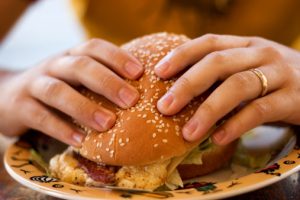 Do you eat to live or live to eat? How you answer that question may reveal a lot about your eating habits. Eating is a way for our body to receive essential nutrients so that we can continue to support good health and perform daily tasks. We don’t actually need that much food in a day to be able to stay healthy and function, but unfortunately, many of us continue to overeat. This is contributing to the growing obesity problem.
Do you eat to live or live to eat? How you answer that question may reveal a lot about your eating habits. Eating is a way for our body to receive essential nutrients so that we can continue to support good health and perform daily tasks. We don’t actually need that much food in a day to be able to stay healthy and function, but unfortunately, many of us continue to overeat. This is contributing to the growing obesity problem.
There are many factors that contribute to a person’s eating habits such as stress, anxiety, and boredom. If you eat when you’re not hungry—but out of an emotional response—then you are emotionally eating. This can be quite troublesome for your waistline and overall health. Many emotional eaters aren’t even aware of their habit and think what they’re doing is normal.
Advertisement
So, how do you begin to recognize your possible eating problem and regain control? For starters, begin to carefully look at how much you’re eating. Using a journal can help you log all your meals and snacks—this brings you face-to-face with how much food you are actually eating. Make your food diary as detailed as possible by including portion size, time of the day you’re eating, and your emotional state when you ate (stressed, sad, happy).
Finish off each entry with the number of calories you took in. Seeing the amount of food you consumed along with the caloric intake can shed light onto whether or not you are an overeater. You may also uncover any bad eating habits you have, like eating after receiving bad news. By recognizing these habits, you can take the necessary steps towards improving the way in which you eat food.
A food diary could save your life
If you don’t think you’re an emotional eater yet you continue to overeat, there are some things you can do to stop yourself. Replace reaching for food with an activity instead. Keeping your mind or body occupied will deter you from eating. It is also a good idea to uncover what your underlying stress and anxiety are being caused by—that way, you can tackle it and remove the problem altogether.
On the other hand, the information you learn by keeping a food diary should not be used to deprive yourself. Starvation is not the answer to overeating. At the end of the day, the body still needs food. The point of this exercise is to help you recognize you have a problem and allow you to take the necessary steps toward developing a healthier relationship with food.
Lastly, it’s okay to ask for help. Requesting the help of a therapist or nutritionist can help you get back on track and improve your eating habits.
Related: The superfood you should be eating more of
